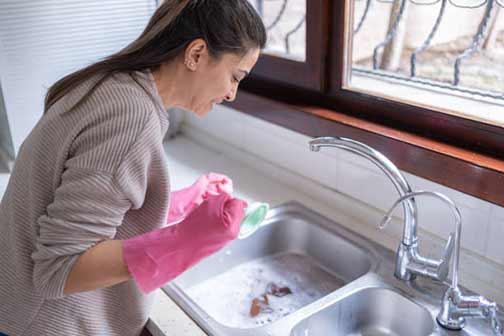
A slow-draining sink in your home is not just an annoying problem. It could be a warning signal of deeper issues in your plumbing, specifically your sewer line, warns Archstone Yukon Management.
That is because the relationship between your sink, sewer line, and other parts of your plumbing is very tight, and what happens to one often affects the others.
So, what does a slow-draining sink in your home mean? What are the probable causes and potential impacts of this problem, and why should you care?
Common causes of slow-draining sinks in your home
- Buildup of debris inside the pipes
Soap scum, solidified fats, trapped food particles, and hair can block drainpipes, leading to restricted flow and sluggish drainage. This is the most common cause of slow-draining sinks. Consequently, every time your sink drains slowly, it is easy to assume that it is due to accumulated debris within the pipes. But other problems in your plumbing can contribute to a slow-draining sink by causing a buildup of debris in the pipes connected to your sink.
- Pipe corrosion
Pipe corrosion is a major problem in plumbing systems, especially in homes with older pipe materials like galvanized steel, cast iron, or Orangeburg. As these materials age and corrode, they become brittle and release tiny flecks of debris that pile up inside the pipes until they block the channel. The narrowed pipe then restricts flow, causing water to pool inside the line until water backs up into the toilet and kitchen sink drains in your home.
- Tree root intrusion
The action of nearby tree and shrub roots can also interfere with the function of your sinks. Because plant roots naturally seek out sources of warmth and moisture inside the ground, they are instinctively drawn to drainpipes and sewer lines. If these roots find a way to break into the line, maybe via hairline cracks or leaks in the pipes, they can block the entire pipe channel. Clogged drainpipes and blocked sewer lines will often appear in your home as slow-draining sinks.
- Ventilation issues in your plumbing
Plumbing systems use a system of vents to balance air pressure and ensure the smooth flow of water throughout the pipes. If these vents are blocked or damaged, a host of problems can follow inside your home. In addition to strange sounds from your plumbing and bad odors inside the house, blocked vents can cause your sinks to drain slowly. This is because the pockets of trapped air within the pipes prevent the free flow of water.
- Improper pipe installation
Wrongly installed pipes can cause slow-draining sinks in your home. Most commonly, this occurs if the right pipe slope is not maintained during the installation. Insufficient or steep slopes will lead to excessive rates of debris buildup within the pipes. Poorly connected pipes can also cause the sinks in your home to drain slowly, because those joints become hotspots where debris accumulates in the system.
Possible impact of slow-draining sinks on your home
Although very inconvenient, a slow-draining sink is really not that big of a problem. The main thing you should be worried about, especially if the problem keeps recurring, is the root cause of the problem. Sometimes, a slow-draining sink is not the problem but a symptom of the problem.
What are the risks of ignoring the warning signs of frequently slow-draining sinks in your home?
- Reduced plumbing efficiency
Due to its interconnected nature, problems in one section of your plumbing can ripple out to affect other sections of the system. Thus, one slow-draining sink today can become a blocked drain and a burst pipe tomorrow.
- Water damage
If water cannot flow out through your drainpipes and sewer line, it will find a way to flow into the structures of your building and your lawn. This can result in costly water damage to your walls, flooring, and landscaping.
- Increased risk of health problems
Any of the highlighted causes of slow-draining sinks in this post can increase the risk of mold in your home, along with the attendant health problems. These plumbing issues can also attract harmful vermin to your property.
- Higher maintenance costs
Plumbing maintenance costs already constitute a major part of your home ownership costs. Unless you fix the problem, a slow-draining sink in your home and its underlying causes can drive this cost even higher.
What should you do about a slow-draining sink in your home?
Quick fixes like using a plunger or a safe (non-chemical) drain cleaner will work if the problem in the sink is caused by the accumulation of debris inside the pipe assembly right under the sink. In this case, your slow-draining sink is a small problem that is easily solved.
However, if the problem is recurring and you have tried DIY solutions to no effect, the cause of the issue probably lies deep inside your plumbing system. For these kinds of complex plumbing problems, you need expert solutions from a professional plumber.

